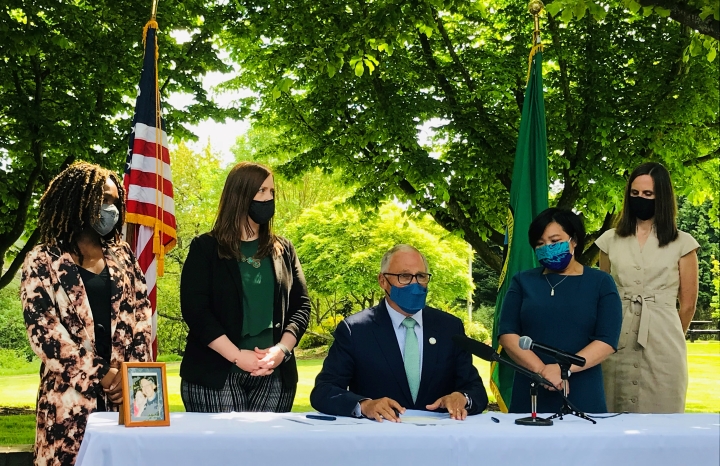A Historic Legislative Session Means Relief for Families
What began as a historic, fully remote legislative session ended in equally historic policy wins as our state’s lawmakers took action in prioritizing COVID-19 relief, cash and food assistance, tenant rights and more.
Governor Jay Inslee reflected on these monumental achievements.
“It was a remarkable session with far-reaching impacts to the long-term well-being of our state. Washingtonians received progress on climate, progress on equity, progress on our tax system, and progress protecting our workers and families,” Inslee said. “So many of these achievements were years in the making. It took hard work, sweat and tears of many in this state to see these policies finally make it over the finish line.”
At United Way of King County, we know that state policy affects our community’s ability to thrive. Our legislative priorities are divided into three key areas: helping students graduate, breaking the cycle of poverty and ending homelessness.
This year, our advocacy prioritized the barriers that prevent sufficient funding to protect families from the triple pandemics of COVID-19, the economic downturn and structural racial inequities that exacerbate both.
Of the 18 bills we advocated for, the legislature passed 11 and are now moving forward as session laws. Below are some highlights of policy wins United Way advocated for this session:
Helping Students Graduate
Community and Technical College Equity and Access: This will increase diversity in CTC faculty, provide added services to Black, Indigenous and other students of color, and shorten residency requirements to increase financial aid eligibility for undocumented students.
Fair Start for Kids Act: This act helps families pay for child care by reducing copays, increasing provider subsidy rates, and expanding eligibility for Working Connections Child Care, which helps low-income families pay for child care. The law will expand Washington’s Early Childhood Education and Assistance Program slots and increase subsidies for providers and health care funding for provider staff.
Breaking the Cycle of Poverty
Working Families Tax Credit: This program, now funded, helps address the regressivity (over-taxation of low-income earners) of Washington’s tax code by giving money back to the lowest income earners through a tax refund. This unprecedented win will refund taxes to communities hit the hardest by the pandemic, relieving some economic hardships and stimulating our state’s economy. United Way advocated for the original bill, which passed a dozen years ago but was never funded and has worked hard with partners since to see this over the finish line. Our Free Tax Preparation volunteers will help working families access this credit along with the federal Earned Income Tax Credit.
Temporary Assistance to Needy Families, or TANF: Cash assistance payments are increased by 15% — the largest bump in history, after decades of flat funding that has been greatly outpaced by the cost of housing.
Emergency Cash Assistance: This bill expands access to emergency assistance to households with children who receive food benefits but not cash from TANF. It modernizes the way eligibility for TANF is calculated, improving on the inadequate Federal Poverty Level measure.
Ending Homelessness
A trio of eviction prevention bills, Just Cause Eviction, Right to Counsel in Eviction Cases, and an increase in the Document Recording Fee, together provide an off-ramp from the eviction moratorium by expanding tenant protections while maintaining the legal rights of landlords. Just Cause requires landlords to have a business reason to evict, Right to Counsel provides tenants with legal representation in eviction court, and the Document Recording Fee increase will fund rental assistance and more than doubles the state’s investments in homeless services. Together, these bills ensure that when the moratorium ends, Washington landlords, who have received $1 billion in rental assistance bailouts, will not be able to wholesale evict tenants who qualified them for those public dollars.
Historic investments in the Housing Trust Fund, $35 million in shelter capacity grants, $131 million in additional funding for the Housing and Essential Needs program and $187 million for foreclosure prevention round out investments in preventing homelessness.
A full breakdown of our policy highs and lows from the 2021 session can be found here.





Comments